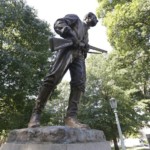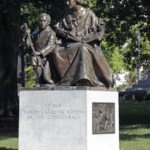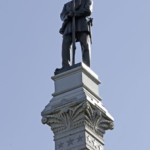North Carolina Will Keep 3 Confederate Monuments At Capitol
RALEIGH, N.C. (AP) — Three Confederate monuments will remain on the North Carolina Capitol grounds, but with newly added context about slavery and civil rights. That’s the decision from a state historical panel, two days after protesters tore down another rebel statue at the state’s flagship university.
The state Historical Commission was responding Wednesday to Democratic Gov. Roy Cooper’s request nearly a year ago to move the monuments to a nearby battlefield.
The commission voted 10-1 to reinterpret the three monuments with adjacent signs about “the consequences of slavery” and the “subsequent oppressive subjugation of African American people.” It urged construction of a memorial to black citizens, which has been discussed for years, as soon as possible. The group of academics, amateur historians and preservationists also acknowledged that the monuments erected decades after the Civil War near the old 1840 Capitol are imbalanced toward the Civil War and the Confederacy.
Cooper responded with a statement decrying a 2015 law passed by the GOP-controlled state legislature that sharply restricts where state and local government officials can relocate such memorials and all but bars their permanent removal. He also said the toppling of the Confederate statue known as “Silent Sam” on Monday night at the University of North Carolina was an example of what happens when people feel their leaders won’t act on their concerns.
“The actions that toppled Silent Sam bear witness to the strong feelings many North Carolinians have about Confederate monuments. I don’t agree with or condone the way that monument came down, but protesters concluded that their leaders would not – could not_act on the frustration and pain it caused,” Cooper said.
Commission member Samuel Dixon, part of a five-member committee that made the recommendations, said that the 2015 law limited what the commission could do.
“I believe the monuments need to tell the truth and based upon the law that we have today I do not think we can move them,” said Dixon, an Edenton lawyer. “But I think we can … tell a better story and tell a full and inclusive story.” Dixon voted with the majority.
But commission member and Bennett College professor Valerie Johnson, who is black, said removal would be appropriate because of the monuments’ links to the Jim Crow era.
“The monuments represent the commitment of North Carolina to uphold the Confederacy. These monuments are a continual visual presence of the ideology of white supremacy,” said Johnson, who voted against portions of the commission resolution. “Removal is not erasure. It is creating a space that reflects all North Carolinians and their contributions to our state.”
The commission’s vote came about 36 hours after the “Silent Sam” statue was toppled on UNC’s Chapel Hill campus. The bronze figure of an anonymous soldier was pulled down from its stone pedestal by protesters who used banners to mask their action.
The statue had been under constant, costly police surveillance after being vandalized in recent months. Many students, faculty and alumni argued that “Silent Sam” symbolized racism and asked officials to take it down.
Republican legislative leaders praised the committee’s recommendations and its civil discourse in contrast to what Senate leader Phil Berger called “mob rule” in Chapel Hill.
The 2015 law “provides for collaborative solutions to use our state’s history to unite, rather than divide, our citizens,” House Speaker Tim Moore said in a release.
One woman who interrupted Wednesday’s meeting by shouting was led out and put in a police car. It wasn’t immediately clear what charges she could face. Police kept a heavy presence around the building and the monuments.
Frank Powell with the Sons of Confederate Veterans in North Carolina couldn’t say whether the group would support the “contextualizing” of the monuments. Commissioners repeatedly emphasized that slavery caused the Civil War, but Powell said that oversimplifies what were its many causes.
Still, Powell said, the commission’s decision was “the best outcome we could have hoped for under the circumstances.” The commission and a state department will decide on the re-interpretation language.
The monuments on the Capitol grounds include the Capitol Confederate Monument, dedicated in May 1895; the Henry Lawson Wyatt Monument, dedicated in June 1912; and the North Carolina Confederacy Monument, dedicated in June 1914.
Cooper asked last September that they be moved to the Bentonville Battlefield site about 45 miles (72 kilometers) away. His request followed a violent white nationalist rally over a Confederate statue in Charlottesville, Virginia, and the toppling of a Confederate statue outside a Durham County government building by demonstrators.







